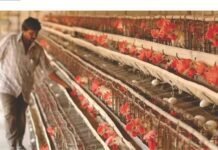She represents the second generation of Lotus Farms Group of companies. Inspired by her father and uncle who started the company in the early ’90s, she was always driven to the idea of starting her own business. After completing her Masters in
Innovation, Creativity and Entrepreneurship from Newcastle University, UK, she came back to India and decided to join the family business. She along with her brother Arun Madhav started a new venture – Lotus Farm Chicken which is a B2C business dealing with the direct selling of products from farm to consumer. Read about her journey below.
You recently joined the industry; would you please share your observation of the Indian Poultry sector?
Consolidation of the industry is evident since India ranks third among the largest egg producers and fourth in chicken production globally. Consumption of both eggs and chicken in the last five years has increased to 68 eggs per annum and 2.5kg per annum, respectively. However, the number of trained professionals is limited in the sector, since most institutions of higher learning do not offer courses on poultry farming, it reflects on the process of modernization of the industry. In my opinion, people should get the chance to be educated about poultry farming (as a potential course in itself) to keep this industry running with the help of new technology and modern methods.
I have also observed price fluctuations which is one of the most challenging aspects of this industry. Due to the price fluctuations, consistency in the market is disturbed. Similarly, managing meat production in lean seasons is a challenge, especially during festivals when consumption is low, or during special events when demand increases.
Balancing your professional and personal life can be challenging, what is your take on this?
Work-life balance is not something that comes by itself, it is an aspect that is acquired by us and which helps us prioritizing according to the situations in the right manner. Poultry is a demanding industry that requires round-the-clock attention. It is important to balance work life and personal life to keep ourselves from drowning. In the beginning, it was quite challenging to maintain a work-life balance, particularly since I was still understanding the workings of the industry. It was not easy to keep up with the fast-moving changes that took place with regard to the price fluctuations and of course, the daily challenges to keep the operations running.
My father, Srihari Reddy, who has been in this industry for more than 25 years now, has helped me understand the importance of leading work-life and personal-life parallelly. Also, my brother, Arun Madhav has always played a big role in supporting me and allowing me to lean on to him, to ensure I maintain a good work-life balance.
I am delighted to share that the company supports work-life balance even for its employees where they are given equal opportunities without any gender bias. We are actually working as a huge family representing diverse backgrounds.
Where do you see the industry going 10 years down the line?
The Indian poultry sector can expand significantly in the next 10 years, given the current per capita consumption rates of both eggs and meat. Notably, poultry is the main source of protein in India, which translates to a potential boost in the industry. As the sector expands, it will provide employment to many youths, too. On the same note, poultry farmers will have to adjust to the modern trends of building the industry and moving forward with the help of technology and digitalization.
Tips for girls who are looking to pursue their careers in the industry.
Initially, being in the poultry industry was classified as fieldwork with low hygiene levels. As a result, most people have perceived the industry as suitable for low-skilled individuals. However, the sector has evolved to include professional responsibilities. For example, the industry introduced positions for veterinarians, sales executives, and nutritionists, among others. I would encourage girls to explore this opportunity by pursuing relevant courses in these areas as a first step, and then move on to appropriate work experience. The poultry industry is a solution to the many potential youths in the nation as it is an industry that is constantly improving itself and expanding rapidly.
We live in a society where it is important for a woman to constantly work harder to be on the same road to success as everyone else. To all the girls and women out there, always remember – never let anyone walk over you, reach for the eggs and you will get chickens.













